History Features
Student attitudes survey, early 1950s
In 1952 The Clocktower, the College student magazine, undertook a student attitudes survey. There were 40 respondents.
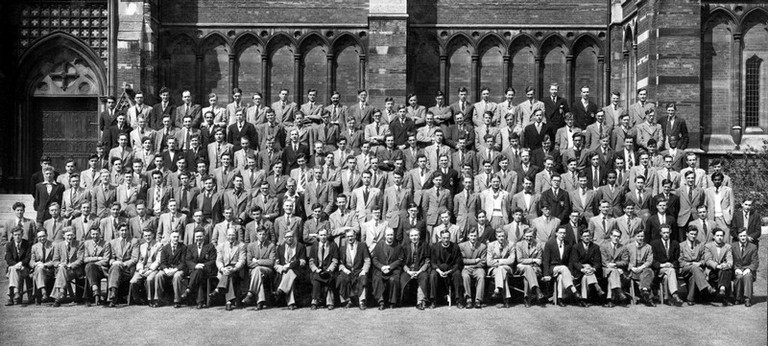
The first question was “Why did you come to Keble?” The answers were varied except that through them all ran the feeling, “I am in Keble, but I did not really mean to be.” A proportion of one in four came on the recommendation of old Keble men (fathers, headmasters, etc.). A similarly large section came because they could not get in anywhere else, or because they did not want to take any entrance exams. The remaining answers do not fall into any clear group except possibly four, which mentioned religious affiliations to the college (“Anglo-Catholic traditions,” “Approved of religious aspirations of its founders,” “reputation for good, sound Catholic Christianity,” “For the good of my soul.”) Other answers include “one who already had fiends at Keble,” “its reputation for cheap living” and “pure chance.”
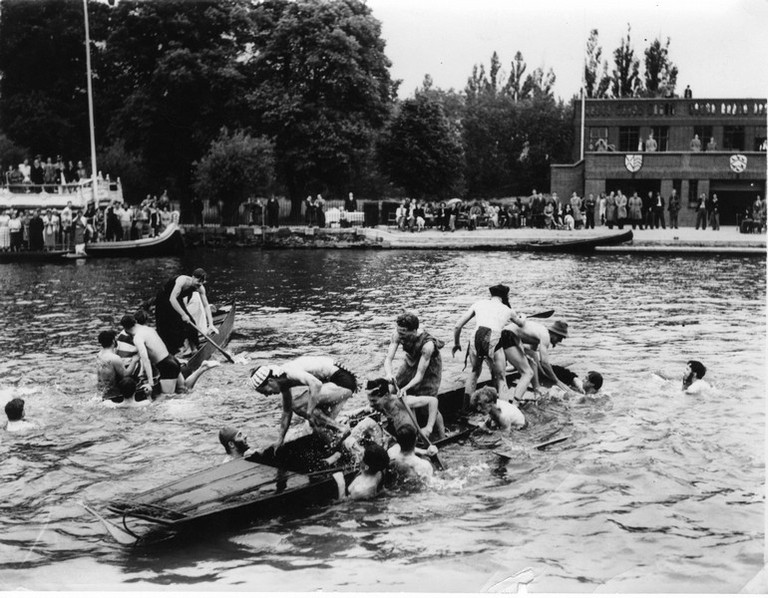
Rag regatta, 1951
The second question, “Do you feel ‘attached’ to Keble, or is there some strong feeling of loyalty towards it?” – produced a series of apathetic answers. Few felt strongly about their college and few felt any antagonism towards it. In fact, few felt anything at all. For the majority it was just a colourless shell in which one worked, ate (occasionally) and slept. However, of those that did feel an emotional tie with the college, their reasons for this included their new found friends at Keble, the individuality of the college and its sports clubs. Someone was attracted by the sanitation, while others found the “chaps” to be “sincere and unassuming.” One typical answer was “Not particularly except that I am in it,” while another was convinced that Keble was the finest college in the world.
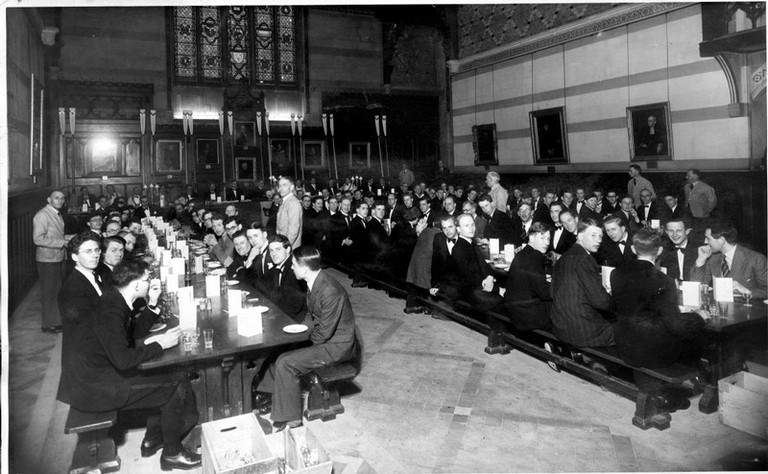
Bump Supper, 1950
Question 3 was “Do you feel there is any lack of College spirit in Keble?” Few thought that there was none at all, but the majority felt something to be lacking. The fact that nearly all attempted to remedy the situation suggests something in itself. Two or three objected to college cliques, while others actively encouraged them as being better alternatives to the hearty mob who supported the local ale houses. A very large number of answers criticised the selection of members of the college, they felt that an ill-assorted bunch of men as were at Keble to-day would never produce college spirit. One wanted no college spirit anyway. Another wanted compulsory games, a third suggested doubling the JCR subscription. A disturbing number of answers felt that there was a lack of a satisfactory relationship between tutors and pupils. Keble men felt that the fault was peculiar to their own college and one who had been “passed out” to another college noticed the difference immediately. One went so far as to suggest the sacking of all Fellows and lecturers attached to Keble and replacing them from other members of the University, as being the only way to revive college spirit. This answer came from a third year man. The majority wanted an improvement in the food and two felt that if the fees were put up £5 a term and the extra devoted purely to meals (approximately 2/- per day! Ed), members would feel better disposed towards the college. One member noted the antagonism between official bodies of the college and individual members, he wanted to be able to sign out for meals (which would save food), he wanted closer co-operation between the JCR officials and others also, and he wanted “the new, pointless regulations to be scrapped in toto.”
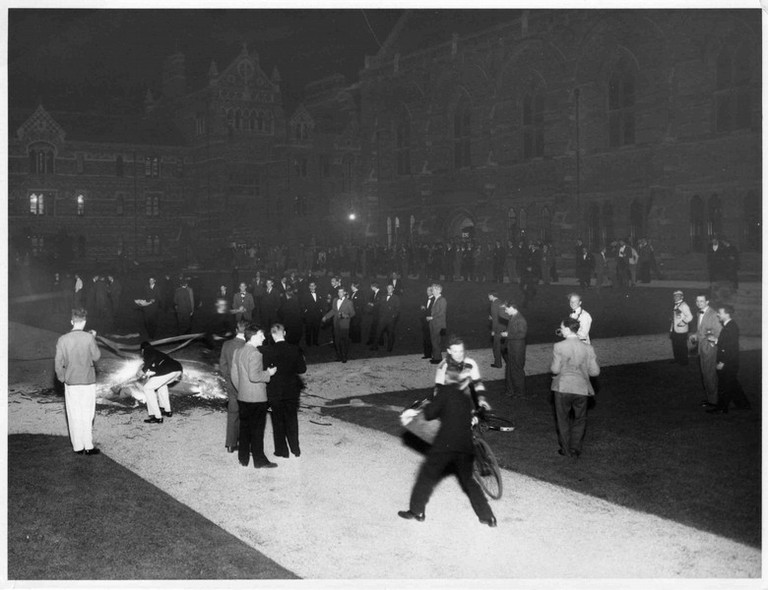
Burning of boat after Bump Supper, 1950
Question 4 read: “Keble has a name for being a friendly college, Please comment.” It was generally felt that Keble was friendly, but no more so than many, another college, many emphasised the obvious lack of Public School men in the college. One suggested that this led to a division of types into rather watertight compartments; another felt that the college never had a “fair start” with other colleges with its lack of prominent figures from larger schools; “fathers of Eton cricketers. Radley oars, etc., were never encouraged to send their offspring to Keble.” Another felt that it was not the position of the college to challenge other colleges in the University, and so Keble is better off as it is now. Some felt that the only division in Keble was by year, faculty or sport. One doubted the sincerity of friendships formed here, suggesting it was based on either beer or the Bible, while another wanted smaller tables in Hall. A third year man felt friendship was kept in existence artificially by devices as “Fresher’s Blinds,” “Commemoration Dinners,” etc. The “chummy” nature of men at Keble was approved by one, while another felt the members of the college linked by a vast inferiority complex engendered against other members of the university.
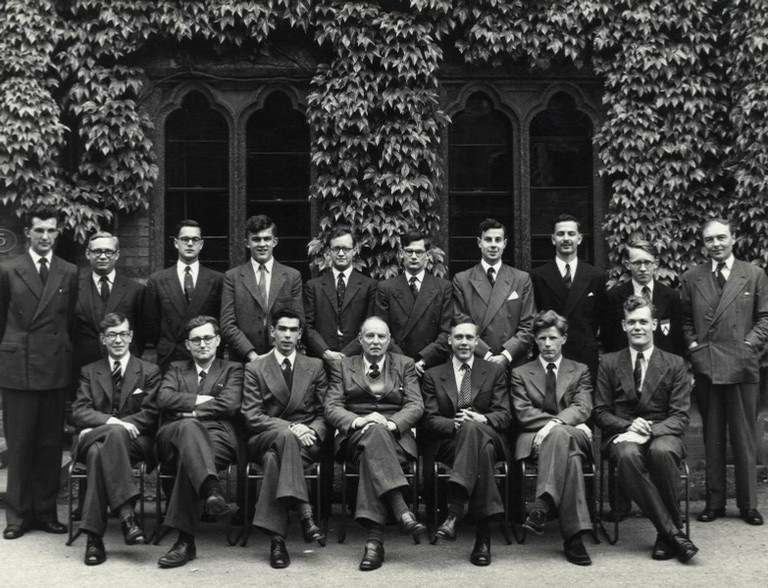
Tenmantale History Society, 1954
Finally, there were nine “Yes-No,” questions which produced some interesting answers. Twenty-six out of forty had seen the Light of the World; others intended to later. The same number had scaled the heights of Keble as had not done so. Only three had not entertained a woman in their rooms. The same number visited the Beer Loft as the Light of the World(!) Only one hadn’t had a J.C.R. tea, but the remarks made by the thirty-nine that had would give the Food Rep. enough work for years to come. The elections for the J.C.R. were well supported – four out five voted.
From The Clock Tower, 1952
back to features